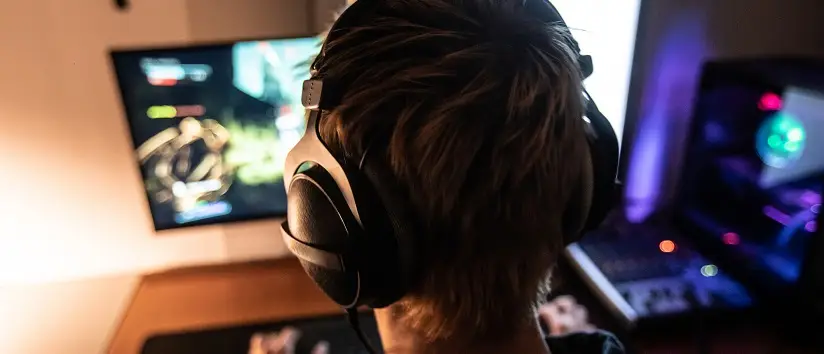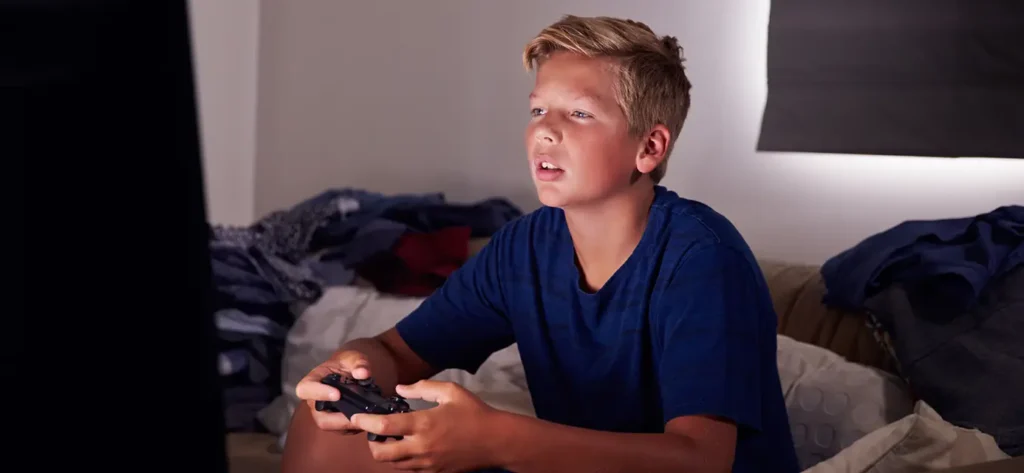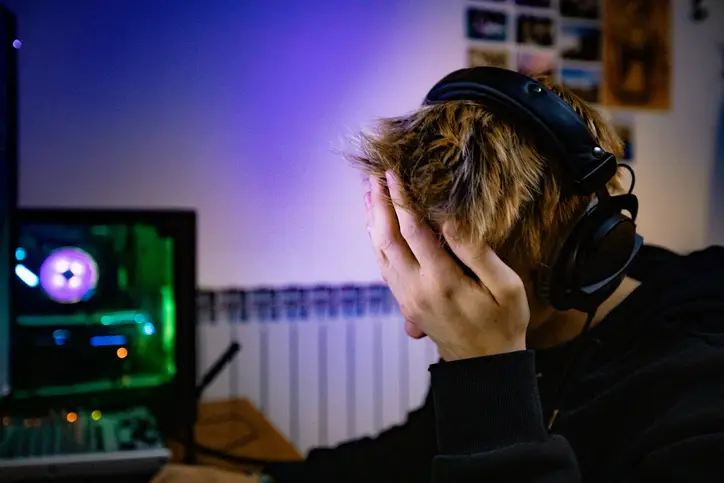As video gaming grows more popular, it’s fun to dive into games to relax. But, did you know too much gaming can actually affect your mental health? In this blog, we’ll dive into how video game addiction can influence mental health, exploring the signs of addiction, its effects, and what can be done to address it. So, let’s dive in and know the mental health implications of gaming addiction and discuss strategies for maintaining a healthy balance.
Contents
What is Gaming Addiction?

Gaming addiction, also known as Internet Gaming Disorder, is characterized by compulsive engagement in video games, often to the extent that it interferes with an individual’s daily life.
Key Characteristics of Gaming Addiction Include:
- Compulsive playing: An inability to control the time and frequency of gaming sessions.
- Interference with daily activities: Gaming takes precedence over work, school, relationships, and other responsibilities.
- Continuation despite negative consequences: Continuing to play games despite facing social, academic, or occupational problems as a direct consequence.
Criteria for Diagnosis: The diagnosis of gaming addiction follows criteria similar to those for other addictive behaviors, including:
- Preoccupation with gaming
- Withdrawal symptoms when gaming is taken away
- The need to spend increasing amounts of time engaged in games
- Failed attempts to control participation in gaming
- Loss of interest in previous hobbies and entertainment as a result of, and with the exception of, video games
- Continued excessive use of games despite knowledge of psychosocial problems
- Deceiving family members, therapists, or others regarding the amount of gaming
- Use of gaming to escape or relieve a negative mood
- Jeopardizing or losing a significant relationship, job, or education or career opportunity because of participation in gaming
These criteria help mental health professionals determine when recreational gaming crosses into addictive behavior, requiring intervention.
Why is Gaming Unhealthy?

While gaming can be a fun and engaging activity, excessive gaming can become unhealthy due to its potential negative impacts on physical and mental health.
Physical Health Concerns:
- Sedentary Lifestyle: Prolonged periods of inactivity while gaming can lead to obesity, cardiovascular disease, and other health issues associated with a lack of physical exercise.
- Eye Strain and Poor Vision: Staring at a screen for extended periods can cause eye strain, dry eyes, and other vision-related issues.
- Poor Sleep Patterns: Excessive gaming, especially late at night, can disrupt sleep patterns and lead to sleep deprivation, affecting overall health and cognitive function.
How Does Video Game Addiction Affect Mental Health?

Video game addiction can have a substantial impact on an individual’s mental health, leading to a variety of emotional and psychological challenges.
- Cognitive Function: Excessive gaming can negatively impact cognitive functions such as attention, memory, and decision-making.
- Emotional Effects: Chronic gaming often induces mood instability, irritability, and increased aggression.
- Social Withdrawal: This withdrawal can exacerbate feelings of loneliness and promote depression, further deepening the reliance on virtual interactions as substitutes for real-world relationships.
- Anxiety and Stress: The pressure to achieve or maintain certain levels of success in games can lead to significant stress and anxiety. Additionally, the fear of missing out on game-related events or progress (commonly known as FOMO) can keep individuals in a constant state of tension and unease.
- Sleep Disturbances: Gaming addiction often affects sleep patterns. Engaging in intense gaming sessions late into the night can lead to insomnia and disrupted sleep, which in turn affects mental health.
Related Blogs:
Effective Strategies for Managing Anxiety
Home Remedies for Managing Stress
The Best Natural Home Remedies For Sleep Disturbances
Recovery Strategies After Gaming Addiction

Once gaming addiction has impacted mental health, it’s important to focus on recovery and rebuilding a balanced lifestyle. Here are some strategies for recovery:
- Seek Professional Counseling: Therapy can help address the underlying issues contributing to the addiction and develop healthier coping mechanisms.
- Establish a Routine: Create a structured daily schedule that includes specific times for various activities, excluding gaming.
- Social Reintegration: Reconnect with family and friends to rebuild relationships and reduce reliance on virtual interactions.
- Physical Activity: Engage in regular physical exercise, which can improve both physical and mental health, and help reduce stress.
- Mindfulness and Relaxation: Practice mindfulness techniques, such as meditation or yoga, to enhance mental well-being and manage stress.
- Join Support Groups: Participate in groups like Computer Gaming Addicts Anonymous (CGAA) for community support and shared experiences.
- Educate on Healthy Gaming: Learn about and establish healthy gaming habits to prevent relapse.
- Limit Exposure: Gradually reduce gaming time and avoid triggers that might tempt excessive gaming.
- Develop New Hobbies: Pursue new interests that provide fulfillment and joy outside of gaming.
- Monitor Progress: Keep track of improvements and setbacks in behavior to adjust recovery strategies as needed.
These recovery strategies help individuals regain control over their lives, improve mental health, and prevent future issues related to gaming addiction.
Treatment Options for Gaming Addiction
Managing and overcoming gaming addiction often requires a multifaceted approach that includes various treatment and intervention strategies. Here are some of the most effective methods:
- CBT is one of the most common therapies used
- Family Counseling
- Joining groups like Computer Gaming Addicts Anonymous (CGAA) can provide peer support and accountability
- Medication, while there is no specific medication approved for the treatment of gaming addiction, medications may be prescribed to treat underlying or associated issues such as depression or anxiety
- Techniques such as meditation and mindfulness can help individuals gain better control
By utilizing these treatment options, individuals struggling with gaming addiction can work towards recovery and regain a healthier, more balanced lifestyle.
Read More: How Does CBT For Addiction Work?
Conclusion
If you’re feeling overwhelmed by gaming addiction or its impact on your mental health, remember, you’re not alone. At MantraCare, our experienced therapists specialize in online addiction counseling and are equipped to help you navigate your way out of the hands of gaming addiction.
Whether it’s dealing with the addiction directly or addressing underlying mental health issues that contribute to or result from excessive gaming, our therapists are ready to assist you every step of the way.
Take action now—your path to recovery and a balanced life awaits!


